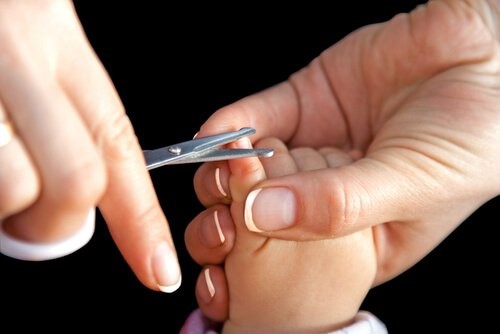What First-Time Mothers Should Know


Reviewed and approved by the psychologist Elena Sanz Martín
Facing birth and immediately embarking on taking care of a newborn is a challenge for every first-time mother. It requires enormous physical, mental and emotional effort. In this article, we’ll share all the things that a new mother should know.
Every new mother must deal with things she previously knew nothing about. Motherhood is one of the best experiences in a woman’s life, but when giving birth for the first time, it’s only natural to have a lot of fears and concerns.
How should I raise my child? What’s normal and what’s a warning sign? These are questions that arise.
The strange color of the baby’s first stools and their frequent colic in addition to all the advice we didn’t ask for can all be overwhelming when motherhood arrives.
That’s why in this article we decided to give you an overview of the realities faced by all new mothers. Pay attention and take note of this list of things that a first-time mother should know when the time comes.

What should a new mother know about breastfeeding?
A new mother should keep in mind that there is no better food for her baby than breast milk. Breast milk satisfies all their nutritional needs and it plays a role in their emotional and intellectual development. It also strengthens their immune system.
Breastfeeding doesn’t only have multiple benefits for your child, it is also healthy for you. It has been shown that breastfeeding can help mothers recover their figure after birth. It also reduces the risk of postpartum depression.
Another aspect that you should keep in mind as a new mother is maintaining eye contact and communication with your baby while breastfeeding. This way you will be able to establish a solid bond that only a mother can have with her child.
Remember that if you decide to breastfeed your baby, your nipples may become irritated at first. In order to avoid this, you can cover your nipples with calendula cream before delivery and even during lactation.
First diaper change, a first-time mother’s challenge
Don’t be alarmed if you notice that your baby’s first stools are dark. This is completely normal although it can be frightening to a first-time mother.
These dark stools are known as meconium. After a while you’ll notice that their stool will clear up.
Another detail that often stresses out new mothers is the frequency at which diapers need to be changed. In general, around 12 diaper changes are recommended daily. It goes without saying that keeping proper hygiene is necessary every time a diaper is changed.
Wash the baby’s bum with warm water or using calcareous oil and cotton. Another option that new mothers can opt for is using a wet towel. It’s important to make sure that this method doesn’t cause the baby’s delicate skin to have allergic reactions.
In order to avoid the famous diaper rash, you can leave your child without diapers for a while in order to let their skin breath. This prevents irritation.
If your child has eczema you can use special creams.
Those cramps!
Every first-time mother has heard people talk about them but she often believes she won’t be able to identify them easily.
Don’t worry, they are easy to notice. When your baby experiences them, they will cry constantly and will not calm down no matter what strategy you try.
This discomfort that the child feels is caused by gas they can’t expel. There are a series of massages that you can perform in order to relieve colic and help them expel gas.
You can take your baby’s legs and gently make them go up and down as if they were pedaling on a bicycle. You can also massage their tummy clockwise or apply the ant trail technique.
Bath time
As you know, you cannot bathe your child until the umbilical cord falls off. You can still clean them however, with the use of sponges and products that are specially designed to facilitate cleaning a baby at this stage.
First you have to take care of their umbilical cord. You can sanitize it with a cotton ball dipped in alcohol. This causes it to dry and fall off quickly.
You also have to pay attention, if you detect a bad smell, blood or pus around their belly button you should consult your pediatrician.
Regarding bath time, it is recommended to always do it at the same time of day, preferable at night. This routine not only brings a sense of order and safety; it also relaxes the baby so they can sleep better.
The water should be around 37 ºC and the room should be heated and closed to avoid drafts of air. Have a towel handy to dry them quickly before they get too cold.
First-time mothers and the baby’s sleep cycle
It is recommended that new mothers lay their babies on their side, as this prevents choking. It also reduces the risk of sudden death syndrome.
Another recommendation is for babies to sleep for up to six months in their parents’ room.
A common mistake that new mothers make is avoiding noise when their children sleep during the day. It’s best to let children fall asleep with the usual sounds of activity in the home so they can get used to them.

The reality is that your child will not sleep well at the beginning. But it’s important for them to differentiate day from night, and associate darkness with time to sleep.
When they are a month-and-a-half old, they will start to relate their sleep patterns with the light-dark cycles. This will make them more predisposed for nocturnal resting.
The baby’s crib should be slightly inclined to prevent reflux. Experts suggest that mothers should place cushions around the baby so they feel safe and protected. Reduced spaces give them a sensation of constant cuddling.
Tears and screams
What? Did you think that all of your baby’s cries would sound alike? Welcome to the world of motherhood.
You’ll start to perceive various types of cries that fit different needs. Here are the most common four:
- Need for diaper changer.
- They are hungry or thirsty.
- When the are sleepy.
- They feel too warm or too cold.
If you have attended all of these basic needs and the crying persists, it will surely feel strange to you. Just pamper them with kisses and caresses, as this will make them feel loved and cared for.
Enjoy these moments!
First-time mother: start your own adventure
Facing birth and then immediately embarking on taking care of a child is a challenge for every new mother since it requires enormous physical, mental and emotional effort.
Worrying about your inexperience and fatigue is normal. So there’s nothing wrong in asking for help.
Nobody was born with a built-in motherhood chip nor are there magic recipes that will help a new mother to be the best mom in the world.
The path is made by traveling through it, enjoy the scenery! And have a good trip!
All cited sources were thoroughly reviewed by our team to ensure their quality, reliability, currency, and validity. The bibliography of this article was considered reliable and of academic or scientific accuracy.
- Olmedo, J. O., Visus, F. S. V., Pérez-Nievas, A. Z., Zubiri, S. B., Urdiroz, A. O., Campistegui, D. V., & Grimá, G. G. (1996). Cambio de postura y disminución de la tasa de mortalidad por muerte súbita infantil en Navarra. An Esp Pediatr, 45, 161-166.
- Brahm, P., & Valdés, V. (2017). Beneficios de la lactancia materna y riesgos de no amamantar. Revista chilena de pediatría, 88(1), 07-14.
This text is provided for informational purposes only and does not replace consultation with a professional. If in doubt, consult your specialist.
